RSA Global Webinar Series – Australasia
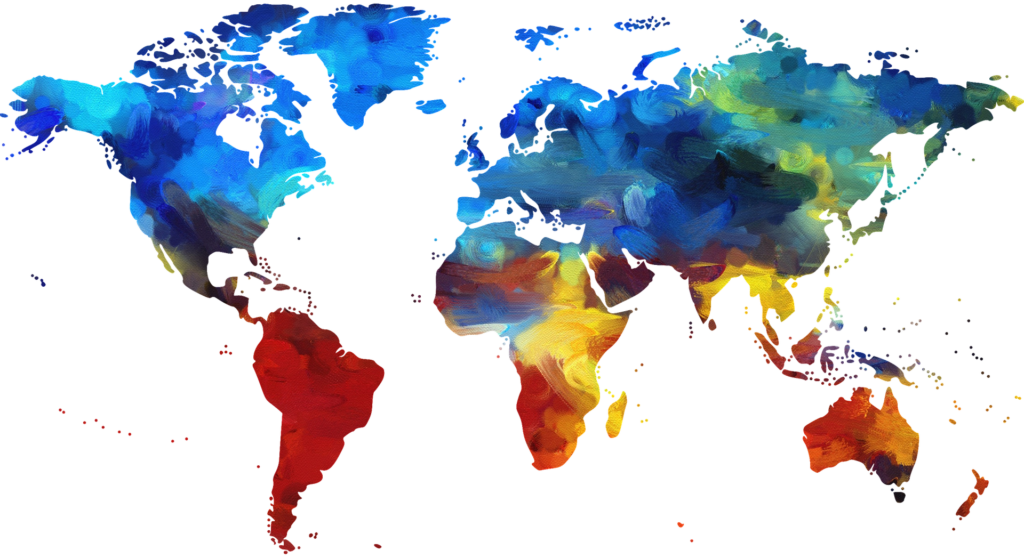
By Daniela Carl, Deputy CEO Regional Studies Association
RSA Global Webinar Series, the globetrotting events series run by the RSA with and for its international networks, started off with the Australasia programme on 2nd November 2020. It featured fascinating insights into regional tourism, the impact of COVID-19 on the tourism industry and routes to recovery. The final session of the programme was a professional development session focussing on conducting fieldwork in times of COVID-19.
Participants joining the Australasia programme came from 25 different countries and contributed to vibrant discussions and enjoyable sessions. The video recordings of the programme are now available on the RSA Lounge.
RSA Global Australasia started with a plenary on the future of tourism without international tourists presented by Professor Susanne Becken (Griffith University, Australia and Department of Conservation, New Zealand) and chaired by Dr Kim Houghton (Regional Australia Institute, Australia). In her thought-provoking presentation, Professor Becken highlighted the changes that the tourism industry was facing due to the pandemic and called for a rethink of travel behaviour to reduce the number of international trips and to make the fewer trips made more meaningful.
She pointed out that tourism is a major industry globally that had been growing year on year, although in many places carrying capacities and the social, cultural and environmental impacts of tourism were starting to be questioned. Professor Becken used her keynote to ask if the current crisis could be an opportunity to change tourism to become more sustainable and meaningful. The inbound tourism industry in Australia and New Zealand is an important income provider and export earner and thus travel bans, and lockdowns have had dramatic impacts (see Figure 1 below).
Figure 1: Economic contribution or dependency on tourism
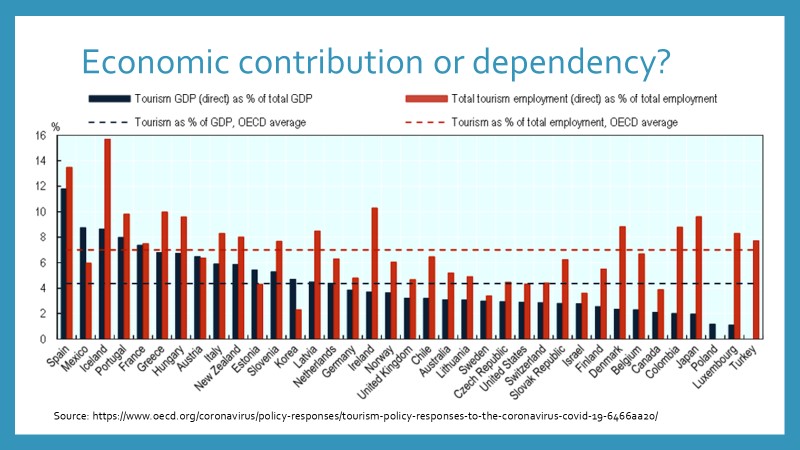
Source: Becken 2020
However, Professor Becken pointed out that within every crisis there was an opportunity and stakeholders in the tourism industry have already started to adjust their products and to explore new markets locally.
Next up was a panel on Reimaging Tourism for 2021 and Beyond, with presentations by Dr Sarah Gardiner (Griffith University, Australia) and Nick Jones (South Australian Tourism Commission, Australia). The session was chaired by Dr Rory Hill (Lincoln University, New Zealand). Dr Gardiner highlighted the importance of the tourism and events industry to the economy of the Gold Coast, Australia, the impact of the pandemic on regional tourism, and examples of tourism businesses that have already adapted, diversified or developed new products for the local and domestic market. However, considering the higher spending of international tourists, Dr Gardiner stressed that it was unlikely that income from local and regional markets would generate similar benefits to the economy, as international tourists on average stay longer and spend more (see Figure 2 below) and it would take seven domestic visitors to generate the income one international visitor would.
Figure 2: Comparison international and domestic visitors’ length of stay and spend per trip
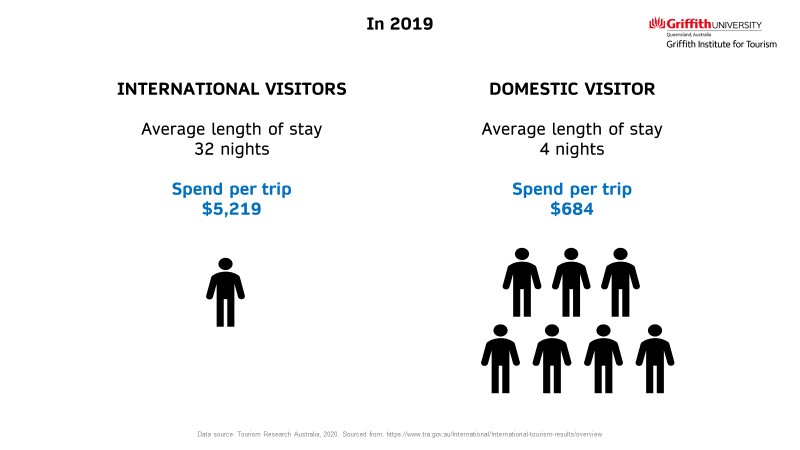
Source: Gardiner 2020
Dr Gardiner provided a number of industry examples and highlighted recent innovations in tourism education such as a new online course for tourism professionals and a new research centre that will focus on tourism recovery strategies.
Following on from Dr Gardiner, Nick Jones presented on the regional tourism and recovery strategies in South Australia. He highlighted the impact of COVID-19 on the region (Figure 3) and subsequent changes in consumer behaviour. These changes include an increase in shorter local trips booked at short notice, an increase in road trips, a greater desire for nature and open spaces but also an increase in the use of travel agents when booking trips.
Figure 3: South Australian Visitor Economy – The anticipated versus the actual impact of COVID-19
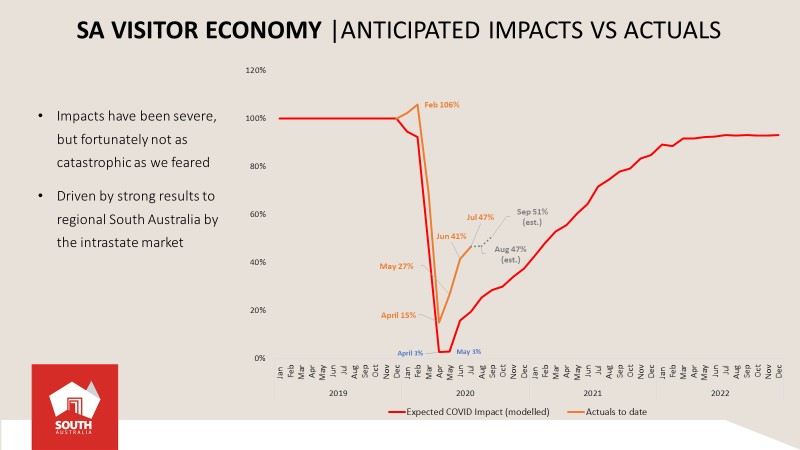
Source: Jones 2020
From the tourism operators’ perspective, business continuity plans, adapting business practices, reinventing, and reimagining business offerings but also a shortrange of staff were the key areas of concern in times of COVID-19. As previous presenters has emphasised, Nick Jones also pointed out opportunities that the crisis had created. With largely reduced international travel for Australians, there were some AUS $60 billion unspent that could potentially feed into regional and local tourism economies. If just some of this money reached the tourism industry, this could help businesses through these difficult times until a more normal situation has been regained. However, as in all industries, this requires businesses to be agile, flexible, and adaptable to the new situation.
The final part of the Australasia Programme, a Professional Development session, was presented by Professor Melissa Nursey-Bray (University of Adelaide, Australia) and chaired by Professor Paul Dalziel (Lincoln University, New Zealand). The session focussed on fieldwork with local indigenous groups in the Legatus region in South Australia (north of Adelaide) where Professor Nursey-Bray worked and reproduced research with five indigenous groups in times when in-person meetings were not possible (Figure 4).
Professor Nursey-Bray’s presentation highlighted the need to firstly establish a personal contact by meeting both in-person and on location to develop a fruitful and trusting relationship. This was even more pertinent with indigenous people for whom the ancestral lands are of upmost importance. Detailed recommendations were provided, and Professor Nursey-Bray concluded that regional research in times of COVID-19 can be done but it needed a different perspective.
Figure 4: Legatus Region in South Australia.
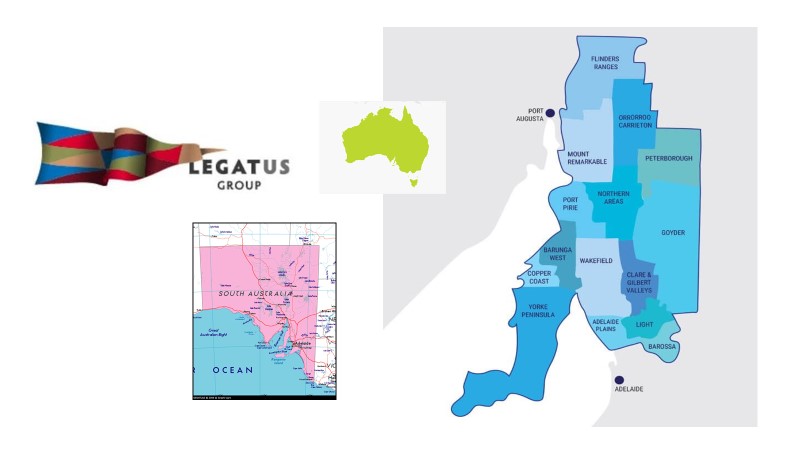
Source: Nursey-Bray 2020
I would like to thank the RSA’s Australia Ambassador Professor Melissa Nursey-Bray (University of Adelaide) and our Ambassador to New Zealand Professor Paul Dalziel (Lincoln University) for their wonderful support and enthusiasm that made the Australasia programme possible. It is always a pleasure to be in this part of the world, either virtually or in-person, and we are looking forward to our next Australasia event and us contributing once again to the local tourism economy.
References
Becken, S. (2020) ‘The Future of Regional Tourism without International Tourists’. [PowerPoint presentation]. Available via the RSA Lounge. (Accessed: 07.12.2020).
Gardiner, S. (2020) ‘Reimagining Tourism for 2021 and Beyond’. [PowerPoint presentation]. Available via the RSA Lounge. (Accessed: 07.12.2020).
Jones, N. (2020) ‘Future of Tourism’. [PowerPoint presentation]. Available via the RSA Lounge. (Accessed: 07.12.2020).
Nursey-Bray, M. (2020) ‘Doing fieldwork research when regions are closed’. [PowerPoint presentation]. Available via the RSA Lounge. (Accessed: 07.12.2020).